
Hall of the Five Hundred (Palazzo Vecchio, Florence)
Vincenzo de Rossi "Hercules kills the Centaur Nessos" Hall of the Five Hundred of Palazzo Vecchio in Florence. Hercules kills Nessos Sculpture - Marble - Height 276 cm - 1568. After his marriage to Dejanire, the daughter of King Aeneas, Hercules left the king's court with the young woman, and on the way, found herself before the river Eventos.

The Hall of the Five Hundred Florence, Italy The great h… Flickr
The Sala dei Cinquecento, the Hall of the Five Hundred, was, first of all, the hall where the Grand Council of Florence met. Five Hundred Hall Palazzo Vecchio It was created under Jérôme Savonarola's leadership to give space for meetings and decisions to the Republic of Florence's Government. Savonarola wanted to be part of the Grand.

This Temple is Five Hundred Rohan Hall Stock Image Image of song, groups 79460677
In 1504, one of the most important artistic disputes in history took place in the Hall of the Five Hundred: Leonardo da Vinci and Michelangelo Buonarroti were summoned to fresco this important Palazzo Vecchio hall with scenes of two key battles in the history of the Florentine Republic—the Battle of Anghiari (la Battaglia di Anghiari) and the Battle of Cascina (la Battaglia di Cascina).
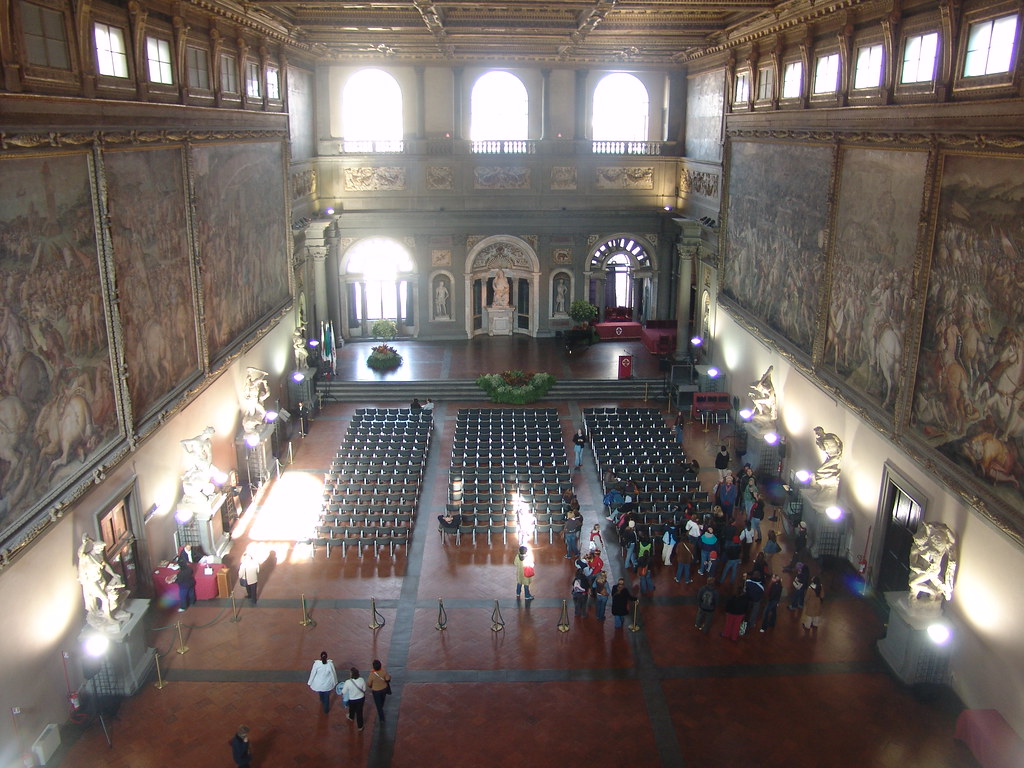
Hall of the Five Hundred, Palazzo Vecchio, Florence Flickr
In 1540 it was renamed "Palazzo Ducale" when Duke Cosimo I took power, and only later did it become known as "Palazzo Vecchio". When Florence was the capital of Italy from 1865 to 1871, it was the seat of the Parliament. There have been few changes to the exterior over the last seven centuries, but the interior has changed appearance a number.

Palazzo Vecchio Hall of the Five Hundred (Florence, Italy) B.L.A.S.T. Live Life to the
Five Hundred Hall The plan to modify the former Hall of the Five Hundred to make it the largest and most richly decorated in all of Europe dates from the end of 1559. Vasari, encouraged by Duke Cosimo I of Medici, made a small wooden model of the project of the future hall and went to Rome to present it to Michelangelo for his opinion and advice.
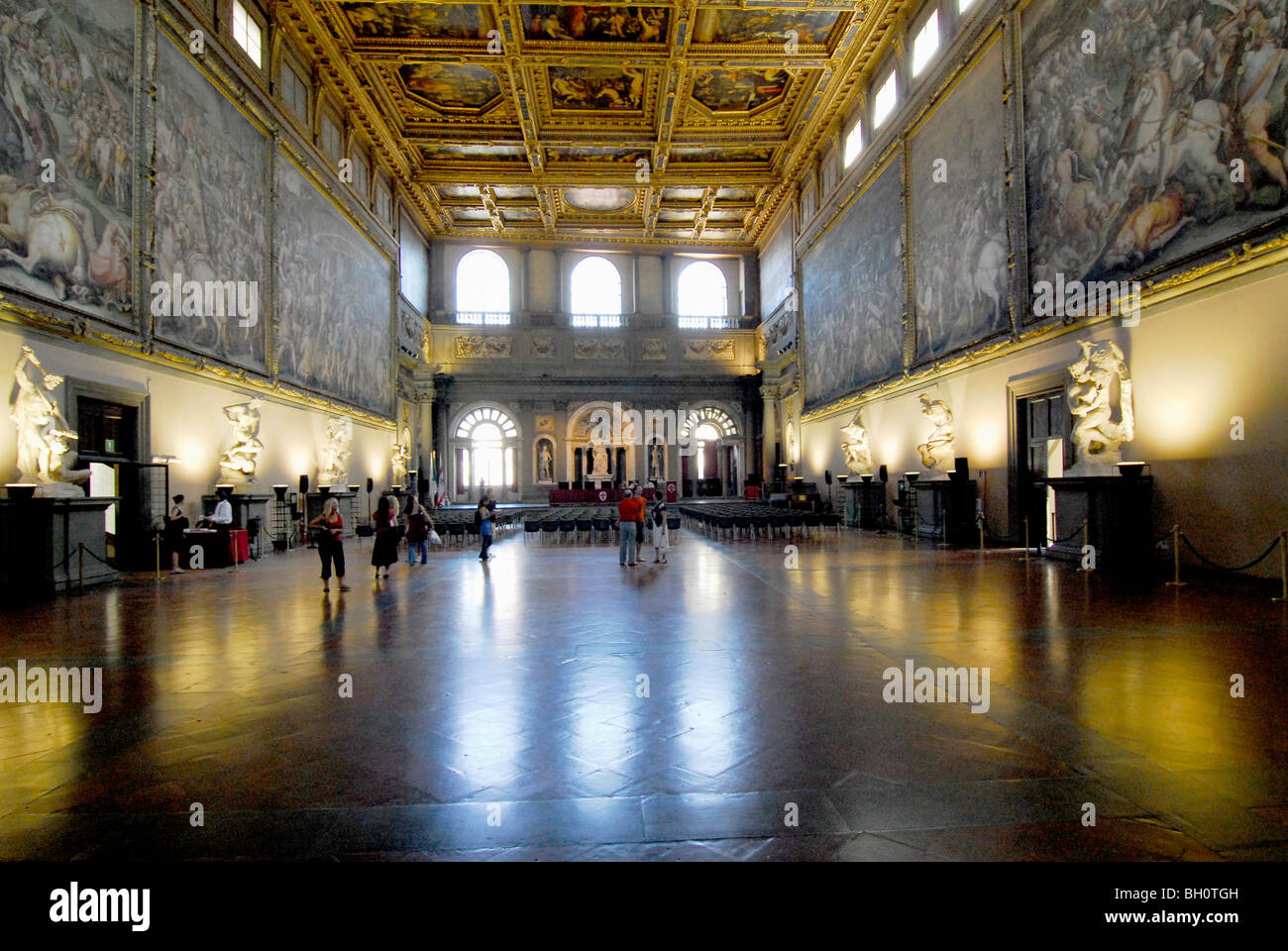
Hall of the five hundred hires stock photography and images Alamy
The Battle of Marciano (La battaglia di Marciano) is a huge, impressive fresco painted by the Italian architect, historian, painter, and writer Giorgio Vasari in 1565 for Cosimo I de' Medici in the Hall of the Five Hundred in Palazzo Vecchio.. The exact name of the painting, which plays a key role in Dan Brown's 2013 novel Inferno, is The victory of Cosimo I at Marciano in Val di Chiana.
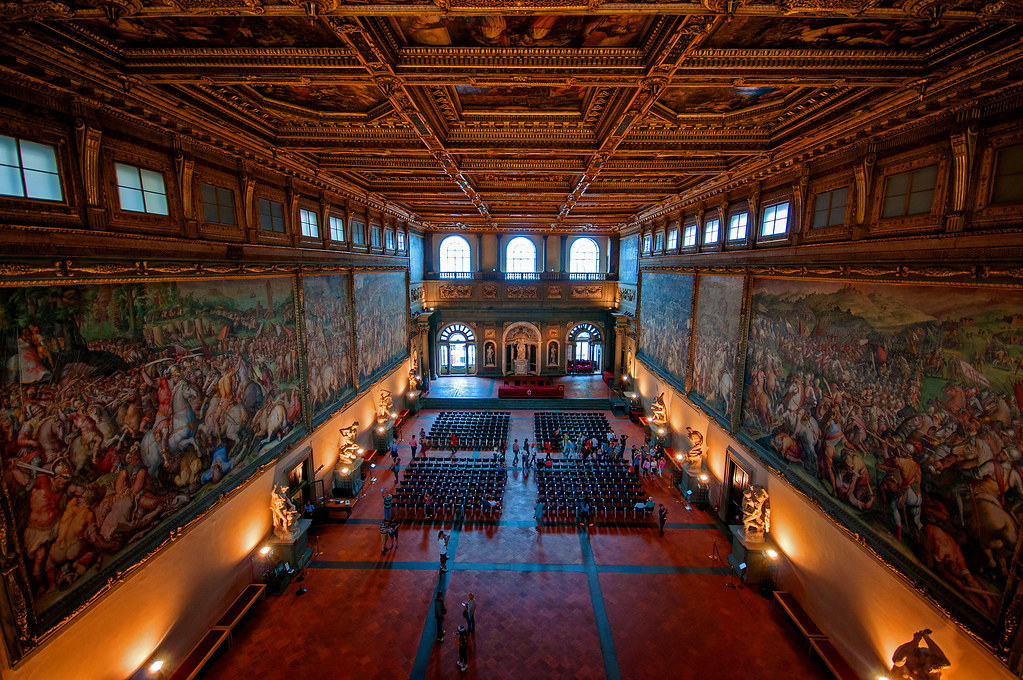
Hall of the Five Hundred Palazzo Vecchio bvi4092 Flickr
The Hall of the Five Hundred (Salone dei Cinquecento) is the largest and most important room in terms of artistic and historic value in Palazzo Vecchio. This impressive hall, which plays a key role in Dan Brown's Inferno, is 54 meters long, 23 meters wide, and 18 meters high. It is the largest room in Italy made for a civil power palace.
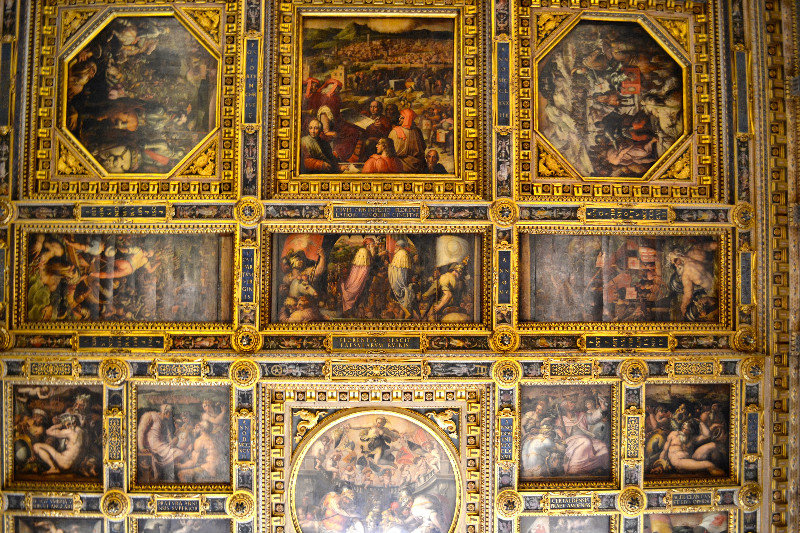
Hall of Five Hundred ceiling Photo
Marble - Height 261 cm - 1530-1534. Genius of Victory This remarkable sculpture by Michelangelo, reminiscent of his "David" of the Accademia, is located in the Hall of Five Cents of Palazzo Vecchio, right in front of the "Triumphant Virtue of Vice" carved by Giambologna. We find here the arm folded back and the hand on the shoulder.

Hall and Ceiling Five Hundred Hall Palazzo Vecchio Florence
The Salone dei Cinquecento ('Hall of the Five Hundred') is the most imposing chamber, with a length of 52 m (170 ft) width of 23 m (75 ft), and height of 18 m (59 ft). It is the largest hall in Italy by volume. It was built in 1494 by Simone del Pollaiolo, on commission of Savonarola who, replacing the Medici after their exile as the spiritual.
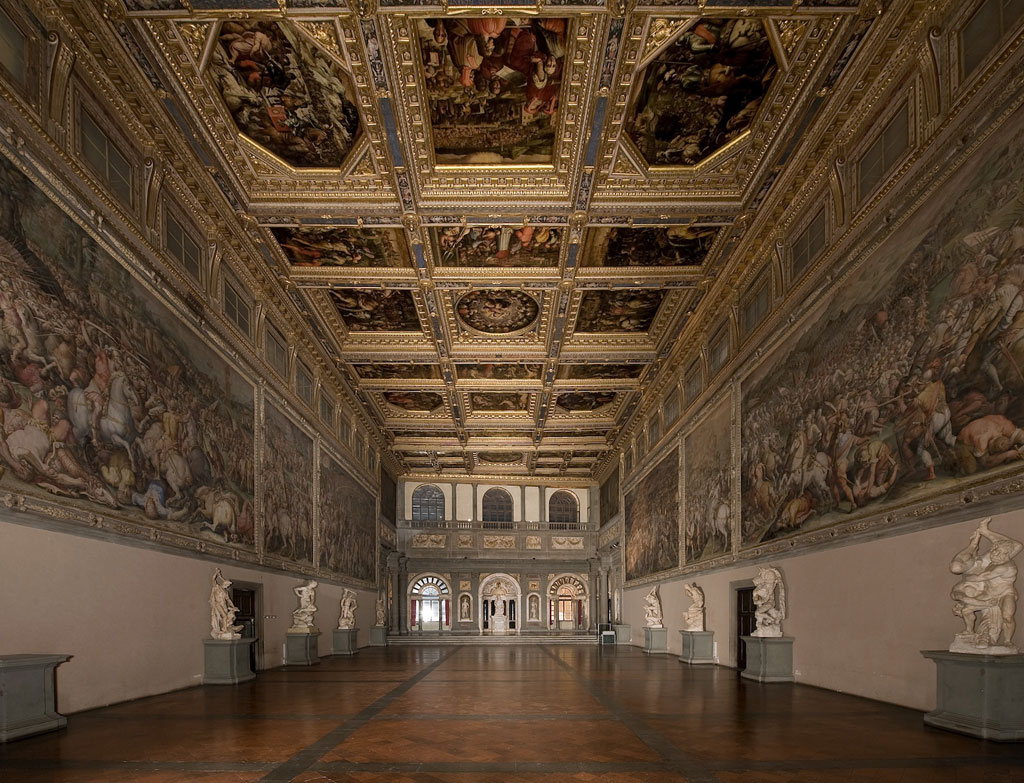
Brookie's
Here are some interesting trivia regarding the impressive Hall of the Five Hundred: In terms of artistic and historic value in Palazzo Vecchio, it is the largest and most important room. At 54 m. long, 23 m. wide and 18 m. high, the hall is the largest room in Italy made for a civil power palace.
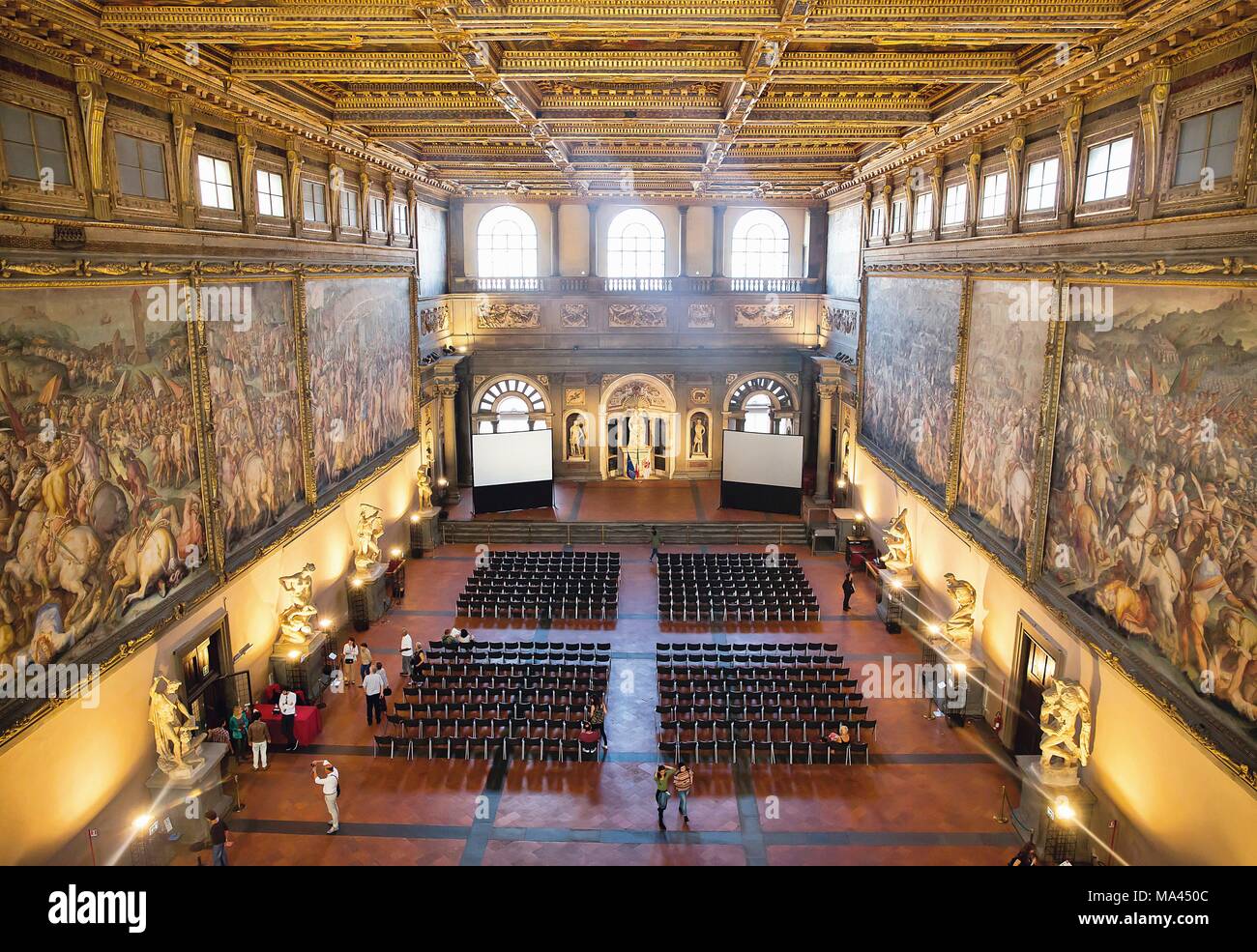
Hall of the five hundred hires stock photography and images Alamy
Palazzo Vecchio was designed and realized in 1299 by Arnolfo Di Cambio as the seat of the Priori delle Arti e della Signoria of Florence.It became the temporary residence of the Ducal family of Cosimo I de' Medici and then the seat of the Royal Family.The intriguing Monumental Quartes, that shows the private and professional life of the Royal family, can still be visited nowadays, richly.
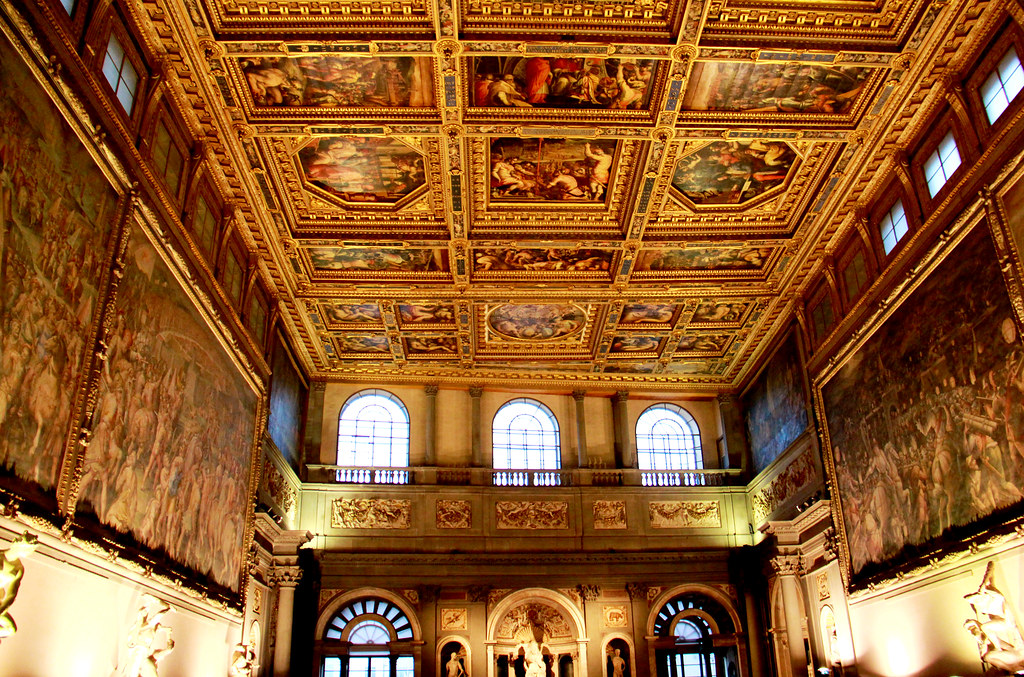
The Hall of the Five Hundred Florence, Italy The great h… Flickr
Five Hundred Hall Palazzo Vecchio This sumptuous hall is of almost 1,200 square metres. It presents at its end a platform corresponding to the audience hall with the statues of Pope Leo X, Giovanni de Medici, son of Lorenzo the Magnificent. Pope Leo X's statue is placed between Giovanni of the Black Bands, Cosimo I de Medici's father, and.

Ceiling Paintings Five Hundred Hall Palazzo Vecchio Florence
The door opens into a space dimly lighted, making the atmosphere even more mysterious. There are bolts, nails, gigantic fir and oak beams, joints, walkways, and the smell of wood. This area, located between the roof of the Palazzo Vecchio and the ceiling of the Hall of the Five Hundred, is commonly referred to as la soffitta ( the garret ).

Palazzo Vecchio Cinquecento, Hall of Five Hundred Florence
Hall of the Five Hundred. This happens to be the most impressive chamber is 52 m long and 23 m broad. It was built by Simone del Pollaiolo in 1494 commissioned by Savonarola who became the spiritual leader of the Republic of Florence, replacing the Medici family after their exile, wished to make it a hub of the Grand Council comprising of five.
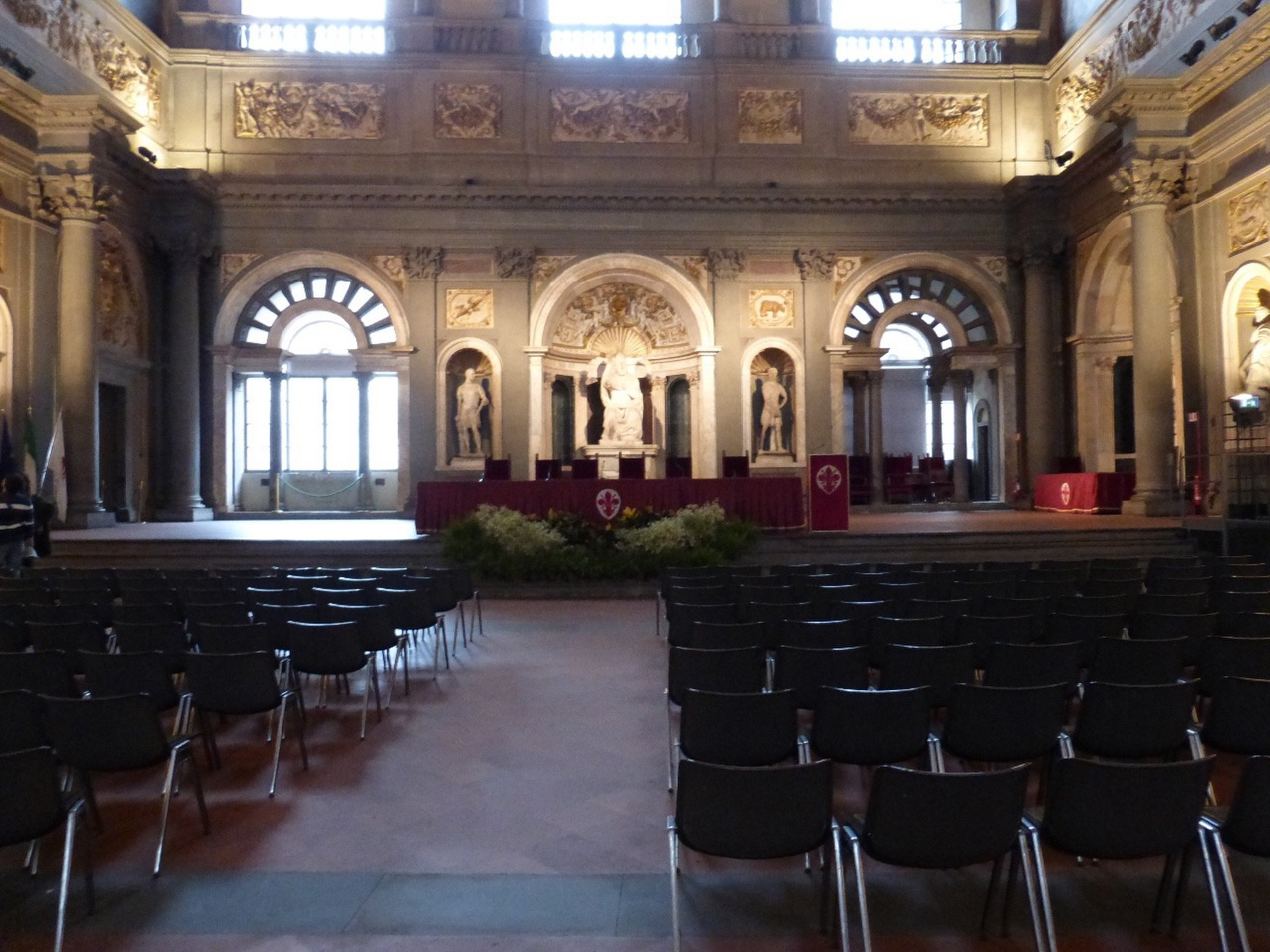
The Hall of the Five Hundred Photo
Apotheosis of Cosimo I of Medici The "tondo" (circular painting) of "The Apotheosis of Cosimo I of Medici" painted by Giorgio Vasari is located in the centre of the ceiling of the Five Hundred Hall of Palazzo Vecchio in Florence. "I depicted Duke Cosimo triumphant and glorious, crowned by Florence with a crown of oak leaves.

Hall of the Five Hundred in Palazzo Vecchio, Florence, Italy Editorial Photography Image of
July 13, 2013 9 Comments Inferno's Symbols. " Cerca trova " (seek and ye shall find) is a mysterious inscription that is located at the top of Vasari's fresco The Battle of Marciano positioned in the Hall of the Five Hundred in Palazzo Vecchio. This inscription and its anagram CATROVACER play a very important role in Dan Brown's Inferno.